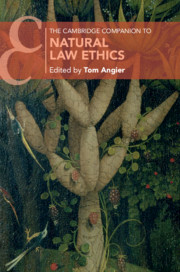Book contents
- The Cambridge Companion to Natural Law Ethics
- Other Volumes in the Series of Cambridge Companions
- The Cambridge Companion to Natural Law Ethics
- Copyright page
- Contents
- Contributors
- Introduction
- Part I The History of Natural Law Ethics
- 1 The Stoics
- 2 Aquinas
- 3 Grotius and Pufendorf
- Part II The Revival of Natural Law Ethics
- Part III Natural Law Ethics and Religion
- Part IV Applied Natural Law Ethics
- Part V Natural Law Ethics
- References
- Index
- Other Volumes in the Series of Cambridge Companions (continued from page ii)
3 - Grotius and Pufendorf
from Part I - The History of Natural Law Ethics
Published online by Cambridge University Press: 21 October 2019
- The Cambridge Companion to Natural Law Ethics
- Other Volumes in the Series of Cambridge Companions
- The Cambridge Companion to Natural Law Ethics
- Copyright page
- Contents
- Contributors
- Introduction
- Part I The History of Natural Law Ethics
- 1 The Stoics
- 2 Aquinas
- 3 Grotius and Pufendorf
- Part II The Revival of Natural Law Ethics
- Part III Natural Law Ethics and Religion
- Part IV Applied Natural Law Ethics
- Part V Natural Law Ethics
- References
- Index
- Other Volumes in the Series of Cambridge Companions (continued from page ii)
Summary
During the seventeenth century, natural law theory became institutionalised as the leading approach to moral philosophy in Protestant Europe. Hugo Grotius (1583–1645) and Samuel Pufendorf (1632–94) were undoubtedly the most influential natural law theorists of the period. Their books went through hundreds of editions and were translated into most European languages. Grotius was widely praised for having been ‘the first to have systematised a science that, prior to him, was nothing but confusion … and impenetrable darkness’. His systematisation of natural law – the science in question – did not consist in deducing moral rules from uncontested definitions and indisputable axioms. His published writings on natural law took no such ‘geometric’ approach. Rather, in a move mirroring Hans Kelsen’s Reine Rechtslehre, Grotius purportedly pioneered a ‘pure’ science of natural law by sharply distinguishing it from divine positive law (i.e. revelation), civil (i.e. Roman) law, and the voluntary law of nations.
- Type
- Chapter
- Information
- The Cambridge Companion to Natural Law Ethics , pp. 51 - 70Publisher: Cambridge University PressPrint publication year: 2019
- 1
- Cited by



